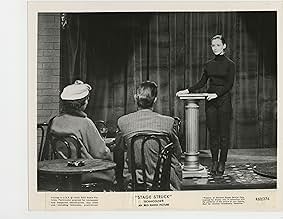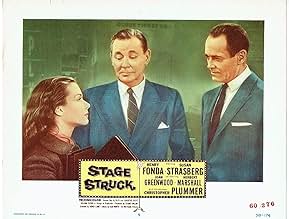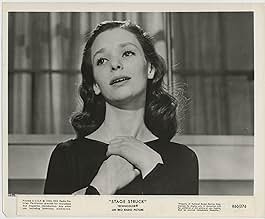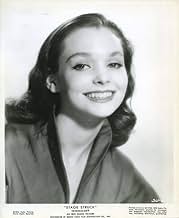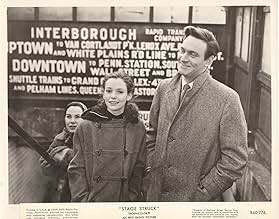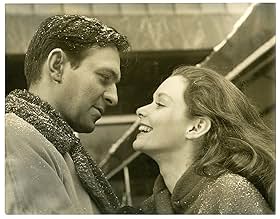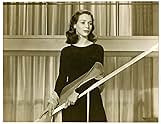AVALIAÇÃO DA IMDb
5,9/10
879
SUA AVALIAÇÃO
Uma jovem chega a Nova York determinada a tornar-se uma grande estrela teatral, mas descobre que seu objetivo pode não ser tão fácil de alcançar quanto ela esperava.Uma jovem chega a Nova York determinada a tornar-se uma grande estrela teatral, mas descobre que seu objetivo pode não ser tão fácil de alcançar quanto ela esperava.Uma jovem chega a Nova York determinada a tornar-se uma grande estrela teatral, mas descobre que seu objetivo pode não ser tão fácil de alcançar quanto ela esperava.
- Direção
- Roteiristas
- Artistas
Pat Harrington Sr.
- Benny
- (as Pat Harrington)
Pat Englund
- Gwen Hall
- (as Patricia Englund)
Merle A. Ashley
- Minor Role
- (não creditado)
Dario Barri
- Handsome Young Man
- (não creditado)
Rolly Bester
- Minor Role
- (não creditado)
Leon Bibb
- Guitar Player
- (não creditado)
- Direção
- Roteiristas
- Elenco e equipe completos
- Produção, bilheteria e muito mais no IMDbPro
Avaliações em destaque
Strasberg gives what is perhaps one of the worst performances by an actress in an "A" film. Her acting is jaw-droppingly terrible, and "over-the-top" is too kind of a phrase. She obviously took her father's instruction to heart - he being Lee Strasberg of the Actor's Studio. The "waiting-for-the-reviews" party during the first thirty-minutes of the film actually contains a cring-worthy rendition of the famous balcony scene from "Romeo & Juliet."
Of course, director Lumet has a tendency to allow his performers to chew the scenery. Fonda is an exception, though. He provides his usual subdued interpretation. Plummer comes across quite nicely, as well.
However, the "romantic" conclusion is totally ridiculous, as there is zero chemistry between the characters who finally end up with one another.
I forced myself to watch this film till the end, but it wasn't easy. Not surprisingly, Strasberg's career eventually settled into "B" movies, and hammy TV roles.
Of course, director Lumet has a tendency to allow his performers to chew the scenery. Fonda is an exception, though. He provides his usual subdued interpretation. Plummer comes across quite nicely, as well.
However, the "romantic" conclusion is totally ridiculous, as there is zero chemistry between the characters who finally end up with one another.
I forced myself to watch this film till the end, but it wasn't easy. Not surprisingly, Strasberg's career eventually settled into "B" movies, and hammy TV roles.
Poor Susan Strasberg. She had not an easy life. She was so lovely. But her delivery in this movie - a remake of a Katharine Hepburn 30s vehicle called "Morning Glory" - is simply not good. It doesn't help that the script is a cliché of a cliché of a cliché, if there is such a thing. Henry Fonda does the best he can with the bad, hoary lines. The supporting cast of Joan Greenwood and Christopher Plummer are excellent and fascinating as usual, but they're stuck with bad lines. In Greenwood's case, bad lines complaining about bad lines!!! And even though Fonda is good, you can't believe Susan would really go for him.
The best thing about the movie is the scene backstage towards the end when the show that might make Strasberg a star, is just about to start. The movie's director shows the stagehands being called their cues by the stage manager, and you get the suspense of what it's like to be backstage just before the curtain goes up.
The stage manager by the way is played by Jack Weston, who played a stage manager the next year in Douglas Sirk's "Imitation of Life," which is also about "the theatuh," and in its complex phoniness and artificiality it rings truer than "Stage Struck." Beloved Herbert Marshall is also in this movie and you can see very easily that he is really walking on a wooden leg.
The street scenes of New York are interesting in this movie. Also interesting is the name of a Greenwich Village nightclub where Strasberg cringingly reads poetry and verse: The Village Voice!
The best thing about the movie is the scene backstage towards the end when the show that might make Strasberg a star, is just about to start. The movie's director shows the stagehands being called their cues by the stage manager, and you get the suspense of what it's like to be backstage just before the curtain goes up.
The stage manager by the way is played by Jack Weston, who played a stage manager the next year in Douglas Sirk's "Imitation of Life," which is also about "the theatuh," and in its complex phoniness and artificiality it rings truer than "Stage Struck." Beloved Herbert Marshall is also in this movie and you can see very easily that he is really walking on a wooden leg.
The street scenes of New York are interesting in this movie. Also interesting is the name of a Greenwich Village nightclub where Strasberg cringingly reads poetry and verse: The Village Voice!
Vermont girl Gertrude Langenfelder (Susan Strasberg) has come to New York City to be a Broadway star under the stage name Eva Lovelace. She's desperate to get any part with producer Lewis Easton (Henry Fonda). Joe Sheridan (Christopher Plummer) is the writer. Despite not liking the role, Rita Vernon (Joan Greenwood) is the leading lady.
This movie depends a lot on Susan Strasberg's performance. All I can say is that she enunciates her lines very knowingly. She's playing a part when the role requires her to be an IT girl. She has to be a newly born diamond outshining all the other diamonds. It's asking a lot and she struggles. I'm sure that her father taught her well but there is something innate about stardom. Every moment with her is a performance when she needs to simply be a superstar. The role may be classified as a try-hard but the actress cannot be just try-hard. The difference is the margin between functional and greatness. This movie has enough acting power to light up Broadway but Susan's flickering light leaves a dull spot at its center. The simple story is not original enough to overpower its flaws.
This movie depends a lot on Susan Strasberg's performance. All I can say is that she enunciates her lines very knowingly. She's playing a part when the role requires her to be an IT girl. She has to be a newly born diamond outshining all the other diamonds. It's asking a lot and she struggles. I'm sure that her father taught her well but there is something innate about stardom. Every moment with her is a performance when she needs to simply be a superstar. The role may be classified as a try-hard but the actress cannot be just try-hard. The difference is the margin between functional and greatness. This movie has enough acting power to light up Broadway but Susan's flickering light leaves a dull spot at its center. The simple story is not original enough to overpower its flaws.
Before this film, I had seen Susan Strasberg in two late 1960s AIP low-budget films 'The Trip' and 'Psych-Out' and enjoyed her performances in both so was quite interested in seeing her in the starring role here.
Alas, not only is she not up to the task, but she takes down the film with her. Her performance in the first 30 minutes or so is truly wretched; she's so strained and overwrought that it makes one cringe.
To be fair, from the time she does a reading from 'Romeo & Juliet' (which is quite charming) her performance settles down somewhat but the damage is done. After all, it's in the opening scenes where we're supposed to believe that she wins over Herbert Marshall as a close friend and enchants Plummer and Fonda but her performance kills any chance of that being convincing and the film never recovers.
However, the film is still fairly entertaining. While Fonda seems rather too genial to convince as a Broadway producer he's always entertaining to watch and helps hold the film together. And Joan Greenwood does a nice balancing act as she gives a melodramatic performance yet still lined with depth.
And, as other reviewers have mentioned, director Sidney Lumet puts in some nice touches with the detail he displays in the preparation that goes behind the scenes for opening night.
Also of interest is that it was released as an RKO picture and was probably close to the very last film released by that studio.
Alas, not only is she not up to the task, but she takes down the film with her. Her performance in the first 30 minutes or so is truly wretched; she's so strained and overwrought that it makes one cringe.
To be fair, from the time she does a reading from 'Romeo & Juliet' (which is quite charming) her performance settles down somewhat but the damage is done. After all, it's in the opening scenes where we're supposed to believe that she wins over Herbert Marshall as a close friend and enchants Plummer and Fonda but her performance kills any chance of that being convincing and the film never recovers.
However, the film is still fairly entertaining. While Fonda seems rather too genial to convince as a Broadway producer he's always entertaining to watch and helps hold the film together. And Joan Greenwood does a nice balancing act as she gives a melodramatic performance yet still lined with depth.
And, as other reviewers have mentioned, director Sidney Lumet puts in some nice touches with the detail he displays in the preparation that goes behind the scenes for opening night.
Also of interest is that it was released as an RKO picture and was probably close to the very last film released by that studio.
Some people are born with talent. Some can acquire it. Others can take all the lessons in the world, and still not grasp that elusive "it". And that's the problem with Susan Strasberg's performance: she clearly understands the nuances and subtleties of acting, but cannot connect that knowledge to the empathy and passion an actor must have to be believable in their role.
When at the party, Eva Lovelace recites the balcony scene from "Romeo & Juliet", and the guests become transfixed, I was never sure if they were staring in awe or horror. Strasberg pauses and reflects on her words perfectly -- at these moments, one could believe she's Juliet watching and waiting for her lover's answers. But when she recites the words -- and a recitation is all it is -- the fire, the passion of Juliet for Romeo is non-existent. She could just as easily have been telling the doorman to call her a cab.
The most interesting aspect of the film was in watching the various methods of acting being presented. Herbert Marshall (who started in silents and early talkies), Henry Fonda (who started in film in the 1930s) and Christopher Plummer (one of the new method actors) are all believable in their roles and mesh seamlessly together. Then there's Strasberg, who is incapable of presenting even a fraction of the range of any of her co-stars. (Frankly, I didn't make the connection between her and her father, and wondered who she knew to have secured the role.) The film is interesting as a curio piece, and Lumet's brilliance in portraying New York's scenery. But as a moving story about the theatre, it can't touch "All About Eve".
When at the party, Eva Lovelace recites the balcony scene from "Romeo & Juliet", and the guests become transfixed, I was never sure if they were staring in awe or horror. Strasberg pauses and reflects on her words perfectly -- at these moments, one could believe she's Juliet watching and waiting for her lover's answers. But when she recites the words -- and a recitation is all it is -- the fire, the passion of Juliet for Romeo is non-existent. She could just as easily have been telling the doorman to call her a cab.
The most interesting aspect of the film was in watching the various methods of acting being presented. Herbert Marshall (who started in silents and early talkies), Henry Fonda (who started in film in the 1930s) and Christopher Plummer (one of the new method actors) are all believable in their roles and mesh seamlessly together. Then there's Strasberg, who is incapable of presenting even a fraction of the range of any of her co-stars. (Frankly, I didn't make the connection between her and her father, and wondered who she knew to have secured the role.) The film is interesting as a curio piece, and Lumet's brilliance in portraying New York's scenery. But as a moving story about the theatre, it can't touch "All About Eve".
Você sabia?
- CuriosidadesEva Lovelace (Susan Strasberg) is told to join the Actors Studio to learn her craft. In real life, Strasberg was the daughter of Lee Strasberg, the acting coach and director of the studio.
- Citações
Lewis Easton: [to Eva] You're a hungry little girl - the theater's offering you a feast.
- ConexõesFeatured in Hollywood the Golden Years: The RKO Story: Howard's Way (1987)
Principais escolhas
Faça login para avaliar e ver a lista de recomendações personalizadas
- How long is Stage Struck?Fornecido pela Alexa
Detalhes
- Data de lançamento
- País de origem
- Idioma
- Também conhecido como
- Stage Struck
- Locações de filme
- Empresas de produção
- Consulte mais créditos da empresa na IMDbPro
- Tempo de duração1 hora 35 minutos
- Cor
- Proporção
- 1.37 : 1
Contribua para esta página
Sugerir uma alteração ou adicionar conteúdo ausente

Principal brecha
By what name was Quando o Espetáculo Termina (1958) officially released in India in English?
Responda

